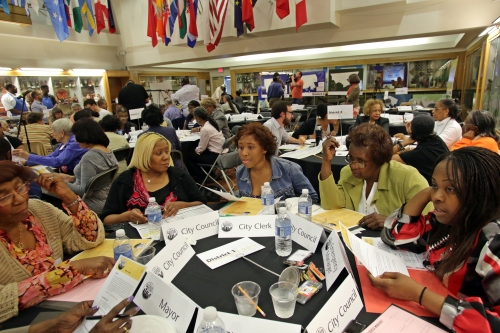
CitizenDetroit: The rebirth of civic engagement in the ‘arsenal of democracy’
An 8-minute documentary on CitizenDetroit.
Irvin D. Reid is Wayne State University president emeritus, distinguished professor and inaugural holder of the Eugene Applebaum Chair in Community Engagement, and CitizenDetroit co-director.
Detroit once stood tall and proud. It was a blue-collar boomtown and model industrial center. By World War II Detroit had become the automobile capital of the world known as the “arsenal of democracy,” a nickname the city earned, in part, for switching manufacturing production from cars to tanks during the war. Related Link
“CitizenDetroit project to engage more residents in contributing to city decision-making and revitalization with $750,000 from Knight Foundation” — Press release (01/07/15)
More recently, Detroit stood on the edge of financial disaster following decades of disinvestment, declining population and shrinking revenue. Its financial situation was so severe that the governor appointed an emergency manager. And in 2013, Detroit became the largest municipal bankruptcy in the nation’s history.
But how did we get here? More important, what can be done to make things better? What if everyday citizens and their neighbors were our mayor and city council members? What if everyday citizens were making decisions about how to lift Detroit back from the edge of disaster?
In 2012, the Forum on Contemporary Issues in Society (FOCIS) at Wayne State University, a project of the Eugene Applebaum Chair in Community Engagement, launched CitizenDetroit, a series of community workshops designed to educate city residents about critical factors and significant events contributing to Detroit’s economic crisis. Sheila Cockrel, a former member of the Detroit City Council and I, with funding from the Eugene Applebaum Family Foundation, co-directed the program.
We wanted to achieve four things in our engagement sessions:
First, we wanted to provide attendees with factual information about the history of disinvestment and deindustrialization that fed the financial crisis engulfing the city. It is important to understand and acknowledge that, throughout Detroit’s tumultuous history, race has posed a serious challenge to all area citizens working together to find solutions.
Second, we wanted to challenge our tendency to sit on the sidelines. It can be easy to listen to our leaders on radio and TV and say that they should have done this or that. By sitting at the table in this simulation as a mayor or council member, participants experience how difficult it is for our elected and appointed leaders to make tough decisions affecting other people’s lives—laying off workers, reducing benefits and cutting city services, etc.
Third, we wanted to provide factual information on Detroit’s financial crisis dispelling the various urban legends that have misguided much of the community dialogue taking place in the city.
And fourth, we wanted to learn from our own citizens how they would set priorities among competing goals in the presence of severely limited resources.
But the ultimate goal of the CitizenDetroit initiative is to have an impact on Detroit’s citizens in their civic engagement in the practice of democracy.
Making real change in Detroit, particularly now as the city has emerged from bankruptcy, will require the involvement of citizens who are engaged earnestly in the political process and who know that their voices can make a difference. For this kind of engagement to occur and be effective, citizens must be educated about social and political issues.
As we move forward through our partnership with Knight Foundation, CitizenDetroit has a tremendous opportunity to impact as many as 1,500 citizens per year for three years in group discussions establishing a more aware and engaged Detroit electorate.
Today, the need for a believable and attainable vision and the optimism that will fuel change in every neighborhood cannot be overstated. It may be that Detroit can go no further toward its long-awaited renaissance until she finds a way for residents, visitors and investors to feel engaged, while gaining a stronger hand in governance.
We believe that when this happens it will be because citizens engaged in new ways of working together toward those common goals. That is to say, when we all have become true partners in democracy.
Recent Content
-
Community Impactarticle ·
-
Community Impactarticle ·
-
Community Impactarticle ·


